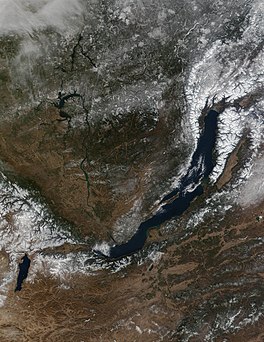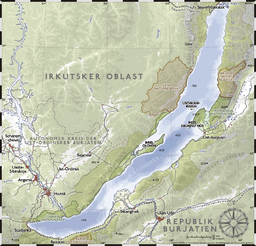Our website is made possible by displaying online advertisements to our visitors.
Please consider supporting us by disabling your ad blocker.
Lake Baikal
| Lake Baikal | |
|---|---|
 Satellite photo of Baikal, 2001 | |
 | |
| Location | Siberia, Russia |
| Coordinates | 53°30′N 108°0′E / 53.500°N 108.000°E |
| Lake type | Ancient lake, Continental rift lake |
| Primary inflows | Selenga, Barguzin, Upper Angara |
| Primary outflows | Angara |
| Catchment area | 560,000 km2 (216,000 sq mi) |
| Basin countries | Mongolia and Russia |
| Max. length | 636 km (395 mi) |
| Max. width | 79 km (49 mi) |
| Surface area | 31,722 km2 (12,248 sq mi)[1] |
| Average depth | 744.4 m (2,442 ft; 407.0 fathoms)[1] |
| Max. depth | 1,642 m (5,387 ft; 898 fathoms)[1] |
| Water volume | 23,610 km3 (5,660 cu mi)[1] |
| Residence time | 330 years[2] |
| Shore length1 | 2,100 km (1,300 mi) |
| Surface elevation | 455.5 m (1,494 ft) |
| Frozen | January–May |
| Islands | 27 (Olkhon Island) |
| Settlements | Severobaykalsk, Slyudyanka, Baykalsk, Ust-Barguzin |
| Criteria | Natural: vii, viii, ix, x |
| Reference | 754 |
| Inscription | 1996 (20th Session) |
| Area | 8,800,000 ha |
| 1 Shore length is not a well-defined measure. | |
Lake Baikal[a] is a rift lake that is the deepest lake in the world. It is situated in southern Siberia, Russia between the federal subjects of Irkutsk Oblast to the northwest and the Republic of Buryatia to the southeast.
At 31,722 km2 (12,248 sq mi)—slightly larger than Belgium—Lake Baikal is the world's seventh-largest lake by surface area,[5] as well as the second largest lake in Eurasia after the Caspian Sea. However, because it is also the deepest lake,[6] with a maximum depth of 1,642 metres (5,387 feet; 898 fathoms),[1] Lake Baikal is the world's largest freshwater lake by volume, containing 23,615.39 km3 (5,670 cu mi) of water[1] or 22–23% of the world's fresh surface water,[7][8] more than all of the North American Great Lakes combined.[9] It is also the world's oldest lake[10] at 25–30 million years,[11][12] and among the clearest.[13]
Lake Baikal is home to thousands of species of plants and animals, many of them endemic to the region. It is also home to Buryat tribes, who raise goats, camels, cattle, sheep, and horses[14] on the eastern side of the lake,[15] where the mean temperature varies from a winter minimum of −19 °C (−2 °F) to a summer maximum of 14 °C (57 °F).[16] The region to the east of Lake Baikal is referred to as Transbaikalia or as the Transbaikal,[17] and the loosely defined region around the lake itself is sometimes known as Baikalia. UNESCO declared Baikal a World Heritage Site in 1996.[18]
- ^ a b c d e f "A new bathymetric map of Lake Baikal. Morphometric Data. INTAS Project 99-1669. Ghent University, Ghent, Belgium; Consolidated Research Group on Marine Geosciences (CRG-MG), University of Barcelona, Spain; Limnological Institute of the Siberian Division of the Russian Academy of Sciences, Irkutsk, Russian Federation; State Science Research Navigation-Hydrographic Institute of the Ministry of Defense, St. Petersburg, Russian Federation". Ghent University, Ghent, Belgium. Archived from the original on 25 December 2018. Retrieved 9 July 2009.
- ^ M.A. Grachev. "On the present state of the ecological system of lake Baikal". Limnological Institute, Siberian Division of the Russian Academy of Sciences. Archived from the original on 20 August 2011. Retrieved 9 July 2009.
- ^ "Baikal". Collins English Dictionary.
- ^ Dervla Murphy (2007) Silverland: A Winter Journey Beyond the Urals, London, John Murray, p. 173
- ^ Cite error: The named reference
odditieswas invoked but never defined (see the help page). - ^ "Deepest Lake in the World". geology.com. Retrieved 18 August 2007.
- ^ Schwarzenbach, Rene P.; Philip M. Gschwend; Dieter M. Imboden (2003). Environmental Organic Chemistry (2 ed.). Wiley Interscience. p. 1052. ISBN 978-0-471-35053-8.
- ^ Tyus, Harold M. (2012). Ecology and Conservation of Fishes. CRC Press. p. 116. ISBN 978-1-4398-9759-1.
- ^ Bright, Michael, ed. (2010). 1001 natural wonders: you must see before you die. preface by Koichiro Mastsuura (2009 ed.). London: Cassell Illustrated. p. 620. ISBN 978-1-84403-674-5.
- ^ "Lake Baikal – A Touchstone for Global Change and Rift Studies". United States Geological Survey. Archived from the original on 29 June 2012. Retrieved 3 January 2016.
- ^ "Lake Baikal – UNESCO World Heritage Centre". Retrieved 5 October 2012.
- ^ "Lake Baikal: Protection of a unique ecosystem". ScienceDaily. 26 July 2017. Retrieved 16 January 2018.
- ^ Jung, J.; Hojnowski, C.; Jenkins, H.; Ortiz, A.; Brinkley, C.; Cadish, L.; Evans, A.; Kissinger, P.; Ordal, L.; Osipova, S.; Smith, A.; Vredeveld, B.; Hodge, T.; Kohler, S.; Rodenhouse, N.; Moore, M. (2004). "Diel vertical migration of zooplankton in Lake Baikal and its relationship to body size" (PDF). In Smirnov, A.I.; Izmest'eva, L.R. (eds.). Ecosystems and Natural Resources of Mountain Regions. Proceedings of the first international symposium on Lake Baikal: The current state of the surface and underground hydrosphere in mountainous areas. "Nauka", Novosibirsk, Russia. pp. 131–140. Archived from the original (PDF) on 15 June 2011. Retrieved 9 August 2009.
- ^ S. Hudgins (2003). The Other Side of Russia: A Slice of Life in Siberia and the Russian Far East. Texas A&M University Press. Retrieved 9 August 2009.
- ^ M. Hammer; T. Karafet (1995). "DNA & the peopling of Siberia". Smithsonian Institution. Retrieved 9 August 2009.
- ^ Fefelov, I.; Tupitsyn, I. (August 2004). "Waders of the Selenga delta, Lake Baikal, eastern Siberia" (PDF). Wader Study Group Bulletin. 104: 66–78. Retrieved 9 August 2009.
- ^ Erbajeva, Margarita A.; Khenzykhenova, Fedora I.; Alexeeva, Nadezhda V. (23 January 2013). "Aridization of the Transbaikalia in the context of global events during the Pleistocene and its effect on the evolution of small mammals". Quaternary International. Quaternary interconnections in Eurasia: focus on Eastern Europe SEQS Conference, Rostov-on-Don, Russia, 21–26 June 2010. 284: 45–52. Bibcode:2013QuInt.284...45E. doi:10.1016/j.quaint.2011.12.024. ISSN 1040-6182.
- ^ "Lake Baikal – World Heritage Site". World Heritage. Retrieved 13 January 2007.
Cite error: There are <ref group=lower-alpha> tags or {{efn}} templates on this page, but the references will not show without a {{reflist|group=lower-alpha}} template or {{notelist}} template (see the help page).
Previous Page Next Page





